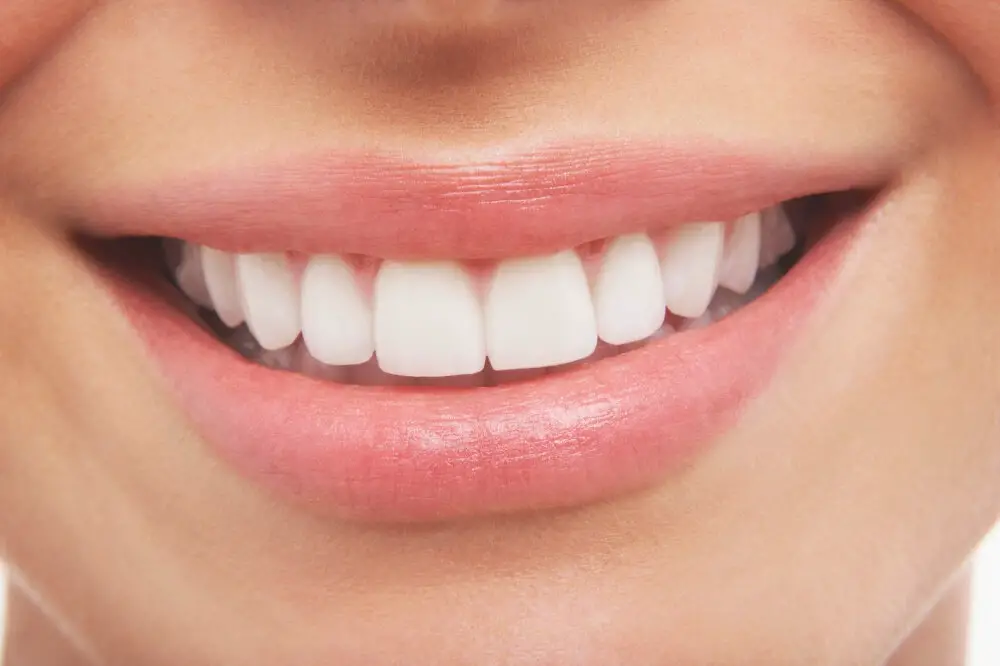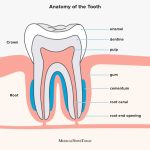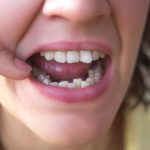Understanding Tooth Sensitivity: Why Does Drinking Cold Water Hurt Your Teeth?

Tooth sensitivity is a common dental problem that affects millions of people around the world. It is characterized by a sharp, shooting pain in the teeth when exposed to certain stimuli such as cold or hot foods and drinks, sweet or acidic foods, or even air. One of the most common triggers of tooth sensitivity is drinking cold water. While this may seem like a minor inconvenience, it can be a sign of a more serious underlying dental issue. In this article, we will explore the causes of tooth sensitivity, the mechanisms behind why drinking cold water hurts your teeth, and what you can do to alleviate this discomfort. Tooth sensitivity can be caused by a variety of factors, including tooth decay, gum recession, tooth erosion, and teeth grinding. These conditions can cause the protective enamel layer of the tooth to wear away, exposing the underlying dentin layer. Dentin is made up of tiny tubules that lead to the nerve center of the tooth. When the dentin is exposed to cold water, air, or other stimuli, it can trigger a painful reaction in the nerve center of the tooth. Understanding the causes of tooth sensitivity is the first step in finding an effective treatment to alleviate your discomfort and improve your overall dental health.
Tooth sensitivity is a common dental issue that can cause discomfort or pain when consuming hot or cold food and drinks. It occurs when the enamel on the outer layer of the tooth wears down, exposing the underlying dentin and nerve endings. This can be a result of tooth decay, gum disease, aggressive brushing, or even teeth whitening products. The exposed dentin and nerves become more sensitive to temperature changes, leading to a sharp, stabbing pain or a dull ache. Tooth sensitivity can be managed with proper dental care, such as using desensitizing toothpaste and avoiding foods and drinks that trigger sensitivity.
Tooth sensitivity is a common problem that many people experience, causing discomfort and pain when consuming certain foods and drinks. There are several triggers for tooth sensitivity, including gum recession, enamel erosion, and tooth decay. Brushing too hard or using a hard-bristled toothbrush can also cause sensitivity by wearing away the protective enamel layer of the teeth. Acidic foods and drinks, such as citrus fruits and soda, can also contribute to sensitivity by softening the enamel and exposing the underlying dentin layer. Other common triggers include teeth grinding, cracked or chipped teeth, and dental procedures such as teeth whitening. Understanding these triggers and taking steps to reduce their impact can help alleviate the discomfort of tooth sensitivity and promote better oral health.
Anatomy of a Tooth

The anatomy of a tooth is a complex structure that plays a crucial role in our overall oral health. Each tooth consists of several layers, including the enamel, dentin, pulp, and cementum. The enamel is the outermost layer of the tooth, which is the hardest substance in the human body. The dentin is the layer beneath the enamel, which comprises the bulk of the tooth. The pulp is the innermost layer of the tooth, which contains nerves and blood vessels that keep the tooth alive. Finally, the cementum is the layer that covers the root of the tooth and provides a surface for the periodontal ligament to attach to. Understanding the anatomy of a tooth is essential in understanding why drinking cold water can cause tooth sensitivity. When the enamel is worn down, the underlying dentin becomes exposed, which is more porous and contains tiny tubules that lead to the nerves in the pulp. When cold water comes into contact with the exposed dentin, it can cause the fluid inside the tubules to move, which triggers the nerves and causes pain. Additionally, certain oral health issues, such as gum recession, tooth decay, and worn-down fillings, can also contribute to tooth sensitivity by exposing the dentin and making the nerves more susceptible to stimulation. By taking care of our teeth and understanding their anatomy, we can prevent tooth sensitivity and maintain our overall oral health.
The tooth is composed of several different parts, each with a specific function. The enamel is the hard, outer layer that protects the tooth from damage and decay. Beneath the enamel is the dentin, a softer layer that contains tiny tubules that connect to the nerve of the tooth. When the dentin is exposed, it can cause sensitivity to hot, cold, and sweet foods. The pulp is the innermost layer of the tooth and contains nerves and blood vessels. If the pulp becomes infected or damaged, it can cause severe pain and require a root canal. The cementum is a layer that covers the root of the tooth and helps anchor it to the jawbone. Understanding these different parts of the tooth can help explain why certain foods and drinks may cause sensitivity or pain.
Tooth sensitivity is a common dental issue that can cause discomfort or pain when consuming cold, hot, sweet or acidic food and drinks. The sensitivity is often caused by the exposure of the underlying dentin layer, which is softer than the outer enamel layer and contains microscopic tubules that lead to the tooth nerve. When the dentin is exposed, stimuli such as cold water can cause the fluid in the tubules to move, which triggers the nerve and causes pain. Other factors that can contribute to tooth sensitivity include gum recession, tooth decay, tooth grinding, and aggressive brushing. Therefore, it is important to practice good oral hygiene, avoid acidic or sugary foods, and use a soft-bristled toothbrush to prevent tooth sensitivity.
Causes of Tooth Sensitivity

Tooth sensitivity is a common dental problem that affects many people worldwide. It is often characterized by sharp pain or discomfort in the teeth when exposed to certain stimuli such as cold or hot drinks, sweet or sour foods, and even cold air. There are several causes of tooth sensitivity, and understanding them is crucial in finding the appropriate treatment. One of the main causes of tooth sensitivity is enamel erosion. Enamel is the outermost layer of the tooth that protects it from damage and decay. When the enamel becomes worn out due to factors such as acidic foods and drinks, tooth grinding, or aggressive brushing, the underlying dentin layer becomes exposed, leading to tooth sensitivity. Another cause of tooth sensitivity is gum recession. The gums are responsible for covering the root of the tooth, which is highly sensitive to stimuli. When the gum tissue recedes, either due to gum disease, aging, or overbrushing, the root becomes exposed, leading to tooth sensitivity. Other causes of tooth sensitivity include tooth decay, cracked or chipped teeth, worn out fillings, and teeth whitening products. It’s essential to identify the underlying cause of tooth sensitivity to find the appropriate treatment and prevent further damage to the teeth.
Enamel erosion and gum recession are two common dental problems that can lead to tooth sensitivity. Enamel erosion occurs when the hard outer layer of the teeth is worn down by acids from foods, drinks or stomach acid. This can leave the sensitive inner layers of the teeth exposed, causing pain when exposed to cold, hot, sweet or acidic stimuli. Gum recession, on the other hand, is when the gums pull away from the teeth, exposing the root surface which is not protected by enamel. This can also lead to tooth sensitivity as the root surface is more porous and sensitive than the enamel. Both enamel erosion and gum recession can be caused by factors such as brushing too hard, grinding teeth, gum disease or acidic foods and drinks.
Grinding teeth and brushing too hard are two common causes of tooth sensitivity. Grinding teeth, also known as bruxism, can wear down the enamel of your teeth, exposing the sensitive dentin layer underneath. This can lead to pain when eating or drinking hot or cold foods. Brushing too hard can also cause enamel erosion, as well as gum recession, which can expose the tooth root and lead to sensitivity. It’s important to be gentle when brushing and to use a soft-bristled brush. Additionally, wearing a mouthguard at night can help protect your teeth from the effects of grinding.
Acidic foods and drinks are a major culprit for tooth sensitivity. These types of foods and drinks can erode the enamel on your teeth, leaving your teeth vulnerable to pain and sensitivity. Common acidic foods and drinks include citrus fruits, soft drinks, sports drinks, and wine. The acid in these foods and drinks can wear away the protective layer of enamel on your teeth, exposing the sensitive dentin underneath. Over time, this can lead to tooth decay, gum disease, and other dental problems. To protect your teeth from sensitivity, it’s important to limit your consumption of acidic foods and drinks and to practice good oral hygiene habits, such as brushing twice a day and flossing regularly.
How Tooth Sensitivity Works

Tooth sensitivity is a common dental condition that occurs when the tooth’s protective layer, known as enamel, wears down or becomes eroded, exposing the underlying dentin layer. Dentin is a porous substance that contains microscopic channels called tubules that connect to the tooth’s nerve center, known as the pulp. When the dentin is exposed, it allows external stimuli such as hot, cold, sweet, or acidic substances to penetrate the tooth’s nerve center, causing pain or discomfort. The level of pain or sensitivity can vary from mild to severe, depending on the extent of enamel erosion or dentin exposure. Tooth sensitivity can occur due to various reasons such as brushing too hard, gum recession, tooth decay, or dental procedures such as teeth whitening or root canal treatment. The sensation of tooth sensitivity can be described as a sharp, shooting, or tingling pain that occurs suddenly and lasts for a few seconds or minutes. The pain can be triggered by different stimuli such as cold or hot beverages, cold air, sweet or sour foods, or even brushing or flossing. The pain may also be felt during or after dental procedures such as scaling or root planing. People with tooth sensitivity often avoid certain foods or drinks and may experience difficulty in maintaining good oral hygiene due to the fear of pain or discomfort. However, tooth sensitivity can be managed and treated with various dental procedures such as desensitizing toothpaste, fluoride treatments, dental bonding, or gum grafting. It is essential to consult a dentist if you experience tooth sensitivity to determine the underlying cause and receive appropriate treatment.
When you drink cold water, it can trigger a sharp and painful sensation in your teeth. This is due to the sensitivity of the nerve endings located in the dentin layer of your teeth. When the cold temperature of the water comes in contact with the dentin, it causes the fluid inside the tiny tubes of the dentin to move. This movement stimulates the nerve endings, which then send a signal to your brain, interpreting the sensation as pain. The sensitivity of these nerve endings can be caused by various factors, including enamel erosion, gum recession, and tooth decay. Understanding the reasons behind tooth sensitivity can help you take preventative measures to protect your teeth and alleviate discomfort.
Dentin and enamel are two crucial layers of the tooth that protect the nerve endings from experiencing pain or hypersensitivity. Enamel is the hard, outermost layer of the tooth that covers the crown, providing a barrier against physical and chemical damage. Dentin, on the other hand, is the sensitive layer beneath the enamel that transmits sensations to the nerves in the pulp. When the enamel is worn down, the dentin becomes exposed, and stimuli such as temperature, sweet or sour foods, and pressure can cause discomfort or pain. Dental erosion, tooth decay, and gum recession are some of the common causes of enamel loss, leading to tooth sensitivity. Therefore, maintaining good oral hygiene practices, avoiding acidic and sugary foods and drinks, and visiting the dentist regularly can help prevent tooth sensitivity caused by enamel and dentin exposure.
Prevention and Treatment of Tooth Sensitivity

Tooth sensitivity can be a real pain, but luckily, there are several ways to prevent and treat it. One of the most important steps you can take to prevent tooth sensitivity is to maintain good oral hygiene. This includes brushing your teeth at least twice a day with fluoride toothpaste, flossing daily, and using an antiseptic mouthwash. By keeping your teeth clean and free of plaque, you can help to prevent tooth decay and gum disease, which are common causes of tooth sensitivity. Another way to prevent tooth sensitivity is to watch what you eat and drink. Avoiding acidic foods and beverages, such as citrus fruits and juices, soda, and wine, can help to protect your tooth enamel from erosion. You should also limit your consumption of sugary foods and drinks, as these can contribute to tooth decay. If you do indulge in these types of foods and drinks, be sure to rinse your mouth with water afterwards to help reduce their effects on your teeth. By taking these simple steps, you can help to keep your teeth healthy and free of sensitivity. When it comes to treating tooth sensitivity, there are several options available. One of the most effective treatments is the use of desensitizing toothpaste. These types of toothpaste contain ingredients that help to block the transmission of pain signals from the tooth to the nerve, providing relief from sensitivity. Other treatments may include the use of fluoride gels or rinses, which can help to strengthen the enamel and reduce sensitivity, or dental bonding or crowns, which can help to protect and cover exposed tooth roots. If you are experiencing tooth sensitivity, it is important to speak with your dentist, who can help you determine the best course of treatment for your individual needs. With the right care and treatment, you can enjoy a healthy, pain-free smile.
Proper oral hygiene practices are essential for maintaining healthy teeth and gums. Brushing twice a day, flossing regularly, and using mouthwash can help remove plaque and prevent tooth decay. It is also important to use a soft-bristled toothbrush and replace it every three to four months. Avoiding sugary and acidic foods and drinks, as well as tobacco and excessive alcohol consumption, can also help prevent tooth sensitivity and other dental problems. Regular dental check-ups and cleanings can help identify and treat any issues before they become serious. By following these simple steps, you can keep your teeth and gums healthy and pain-free.
If you experience tooth sensitivity, desensitizing toothpaste and mouthwash can be a great solution to alleviate the discomfort. These products work by blocking the tiny tubules in the dentin, which are channels that connect the surface of your tooth to the nerve endings inside. By blocking these channels, desensitizing toothpaste and mouthwash prevent the stimuli that cause pain from reaching the nerves. This can help you enjoy everyday activities, like drinking cold water or eating ice cream, without wincing in pain. Desensitizing toothpaste and mouthwash typically contain compounds like potassium nitrate or strontium chloride, which help to soothe nerve endings and reduce sensitivity over time. However, it is important to note that these products may take several weeks of consistent use before you start to notice a difference.
Severe cases of tooth sensitivity can be treated with a variety of dental procedures. One option is applying a fluoride varnish to the teeth, which helps to strengthen the enamel and reduce sensitivity. Another option is a dental bonding procedure, where a tooth-colored resin is applied to the affected tooth to cover exposed roots or worn enamel. In cases where the sensitivity is caused by receding gums, a gum grafting procedure may be necessary to cover the exposed roots. For more severe cases, a root canal may be needed to remove damaged or infected tissue from the tooth. It’s important to consult with a dentist to determine the best treatment plan for your specific case of tooth sensitivity.
Tooth sensitivity can be a frustrating and painful experience, especially when something as simple as drinking cold water can cause discomfort. The root cause of tooth sensitivity is often due to the exposure of dentin, the layer of the tooth underneath the enamel, which can result from gum recession, enamel erosion or tooth decay. The dentin contains microscopic tubules that lead to the nerve endings in the tooth, which can be triggered by changes in temperature or pressure, causing the sensation of pain. Understanding the underlying causes of tooth sensitivity can help individuals take preventative measures, such as using toothpaste designed for sensitive teeth or avoiding acidic foods and drinks, to manage and reduce tooth sensitivity.
If you are experiencing tooth sensitivity, it is important to seek dental advice as soon as possible. Tooth sensitivity can be caused by a variety of factors, including tooth decay, gum disease, and tooth grinding. Without proper treatment, tooth sensitivity can worsen over time and lead to more serious dental problems. Seeking dental advice can help identify the underlying cause of your tooth sensitivity and provide you with the necessary treatment to alleviate your symptoms. Don’t suffer in silence and risk further damage to your teeth – seek dental advice today to ensure a healthy, pain-free smile.
Conclusion

In conclusion, tooth sensitivity is a common dental problem that affects millions of people worldwide. Drinking cold water can be painful for those with sensitive teeth due to the exposure of the tooth roots and nerve endings. The causes of tooth sensitivity can range from brushing too hard, gum recession, tooth decay, and even genetics. It is important to address tooth sensitivity through proper dental care, including using a soft-bristled toothbrush, avoiding acidic foods and drinks, and seeking professional dental treatment when necessary. With the right approach, tooth sensitivity can be managed effectively, allowing individuals to enjoy their favorite cold beverages without discomfort.







